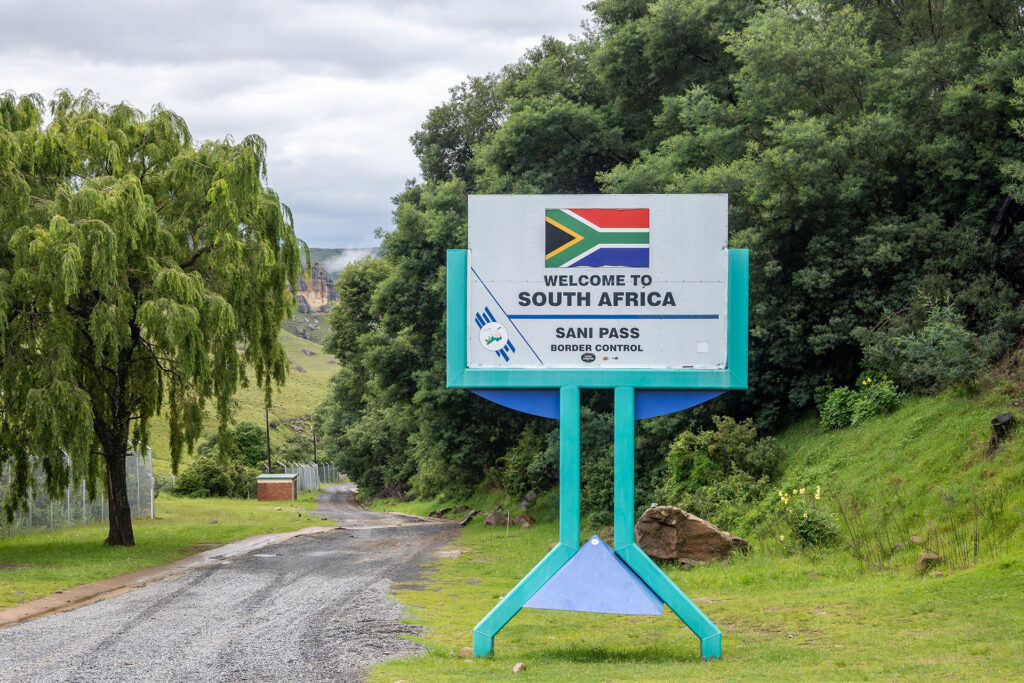Since 2016, IT company director Hannah has filled five passports.
As a result of commuting most days from her home base of Ladybrand, South Africa, over the border to Maseru, Lesotho, she’s accumulated four passport stamps each day — two on each side.
Being a cross-border commuter like Hannah is a pricey, time-consuming, admin-heavy business, despite land-locked Lesotho sharing a 909 km border with South Africa, which completely surrounds it. Ladybrand is just 21 km from Maseru.
Hannah’s 48-page “maxi” passport doubled in price last November to 1,200 South African rand (ZAR, around $66). Before that, after pandemic restrictions were lifted in 2021, a fortnightly Covid test was required, at a cost of 800 ZAR (around $44). This also added to the queue at the border Hannah found herself in almost daily. At its worst, it could take three hours to get back into South Africa, for what would essentially otherwise be a 20-minute drive.
Hannah helps run an IT business headquartered in Maseru that’s been in the family since the late 1970s. Managing the company requires giving in-person directions to staff based on the ground, so despite the headaches and hiccups, making the trip across the border is simply part of her job description, including the logistic, financial and administrative considerations that come with it.
When the grass is greener on the other side
Hannah is one of an estimated 28,000 people that cross the South Africa-Lesotho border daily. Cross-border commuters like Hannah — who live on one side of a border and travel to the other regularly for work — are found all over the world, wherever these borders offer close proximity to an urban center and therefore employment opportunities.
For example, around 250,000 people daily use the Johor-Singapore Causeway between Malaysia and Singapore, with Malaysians drawn to better job opportunities and a more favorable currency on the other side. In Mexico, around 90,000 people cross into the U.S. regularly for work, making up around 7% of the collective salaries earned by households in northern Mexico municipalities.
Within the E.U., thanks to the free movement principle, nearly 2 million people fit the description of a cross-border commuter. The most common commutes are between Poland and Germany, France and Luxembourg, Hungary and Austria, Germany and Luxembourg, and France and Belgium.
At borders where free movement doesn’t apply, as in Hannah’s situation, traffic congestion and queues are common. As a South African resident, Hannah also needs a special permit to work in Lesotho, which is also the case for commuters crossing the border in Malaysia-Singapore, Mexico-U.S., and into the E.U. for non-E.U. citizens.
That work permit, once it’s secured, brings together two key pieces of the puzzle: tax and payroll. In Hannah’s case, all employees of Lesotho-based companies must register with Revenue Services Lesotho (RSL), which allocates individuals a taxpayer identification number, or TIN, which then links to their work permit. When it’s time to pay salaries, Lesotho companies paying South African-based staff with valid work permits can do so via the regular PAYE process, where employees are paid their salary with tax withheld via the company, which pays it directly to RSL.

Keeping it simple with DTAs
Rather than pay tax twice to both the Lesotho and South African governments, employment situations like Hannah’s are covered by the Double Taxation Agreement (DTA) South Africa has with Lesotho, which applies the credit method for the elimination of double taxation. Under the credit method, the country in which the employee is resident gives credit for the other country’s tax against its own tax. In addition, South Africa provides a foreign tax credit to South African tax residents who pay tax in another country on income which is also taxable in South Africa.
South Africa has DTAs with 79 countries worldwide, to help residents avoid being taxed twice on the same income. These comprise 23 of the 54 countries in Africa, and include fellow neighboring countries Botswana, Namibia and Zimbabwe. In Europe, Germany, France, the U.K. and Italy are among those which enjoy DTAs with South Africa, extending throughout Asia to the likes of Japan, China and Indonesia, and across North and South America.
According to the International Center for Tax and Development, there are over 3,000 tax treaties in place, with some of the most obvious ones occurring across European borders: Austria and Germany, France and Italy, and Spain and Portugal, for example. Some of these have been updated to reflect remote working. For example, from the beginning of 2023, the cross-border agreement between France and Switzerland authorizes cross-border commuters to work up to 40% from home without impacting their tax situation. Luxembourg and Germany have also implemented something similar.
As a “frontalier,” or cross-border commuter from France to Switzerland, Adam, a lawyer in the beauty industry, explains: “You pay taxes to Switzerland via payroll like PAYE, and then the Swiss canton pays the relevant amount to the French authorities. That means you do not owe anything extra when it comes time to do your French taxes.”
But some cross-border commuters still need to declare their income to one or both countries.
For example, in South Africa, “If you apply the legal term ‘resident,’ a South African resident who is not out of the country for 60 consecutive days, and 183 days per year in total, but is earning a salary from work conducted in another country, needs to declare that they have paid foreign tax in their tax return,” South African tax law specialist Alan Jacobs explains. That is then deducted when the tax owed is calculated, so essentially, tax is not paid twice.
There could also be discrepancies in terms of tax deductible expenses. As Jenny Klein, principal tax associate at African law firm ENS, explains, domestic tax laws of different countries may provide for different tax treatment of income and/or deductible expenses.
“So it is possible that, for example, one country may allow the deduction of a particular expense which is not tax deductible in another country, or that pension income is taxed differently — but this is based on each country’s domestic tax laws rather than the terms of any applicable DTA,” Klein says.
Other cross-border commuters
While an almost daily cross-border commute like Hannah’s is common for the hundreds of companies that employ people on either side of the South Africa-Lesotho border, there can be a number of other scenarios where it’s necessary to understand how to avoid double taxation.
Klein gives the examples of secondments, remote working arrangements or fly-in/fly-out roles. In a secondment, a South African employer can assign or second an individual to a subsidiary in another country, for a period of several weeks to several years. In a remote work setup, an employee could live in a foreign country but work for a South African company.
A South African resident could also, for example, work at a mine in Namibia, flying in and out on a weekly basis. In all situations, the relevant work permits and visas are still required, and the employer needs to understand if a DTA applies, and if so, what the specific conditions are, as these may vary. A South African company could also opt to set up a branch or subsidiary in the foreign country, through which they could employ people directly.
“My advice is you need to plan cross-border arrangements in advance, and get proper tax advice to make sure you understand what the potential consequences are of the arrangement and to meet all the tax compliance obligations in both countries, for the employer and the employee,” Klein says.
Despite the complexity of cross-border commuting, the economic and commercial benefits are evident from the employer, individual and government perspectives: tapping into greater employment and expansion opportunities while fostering international relationships.
“You’re likely to always have South African-based employees who work in Lesotho because of its proximity to South Africa, and the fact there would always be associated companies in the two countries — I don’t see that changing, because that’s driven by commercial considerations,” Klein says. “South Africa’s economy is also larger and more robust than many of its neighbors, so it’s a quite popular holding company jurisdiction.”
Commuting as a legacy
For Hannah, commuting across the border has become part of the family legacy. “My great-grandad opened this company over 40 years ago now, and my family has been doing it for all these years. They’ve been through more than I have,” she says. “Some family members used to travel on the same bridge as a train line, so they would have to watch out for a train if they were going in the opposite direction.”
She doesn’t expect the situation to change anytime soon.
“Our whole family lives in South Africa and owns this company, so we can’t leave it up to other people all the time. There needs to be a presence from the family,” she says.
She does, however, allow herself to work from home on Fridays. “That’s when the border tends to get a bit hectic, so sitting in the queue for an hour, and then getting home, cooking dinner, then putting my 5-year-old in the bath really does not make my week any better,” Hannah says.
Read more
Sign up to keep up to date with ReThink Q.








